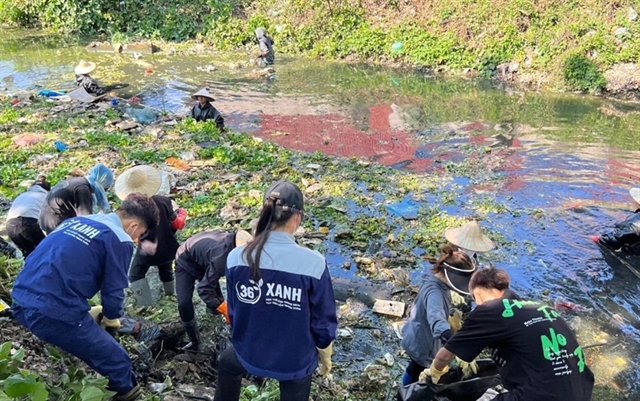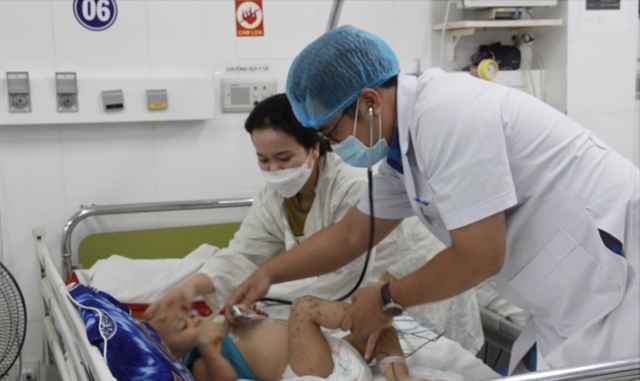 Life & Style
Life & Style


|
| Pediatric nurse Lê Hồng. — Photo courtesy of Family Medical Practice |
By Lê Hồng*
According to a recent survey in the UK, in the summer parents tend to give their children up to five times more sweetened foods than any other time of year. A survey of 1,000 couples with children between the ages of two and 17 found that sugar intake spiked as children began summer holidays.
Ice cream and sugary drinks are the two biggest culprits, with only one in 10 people sharing that their kids eat more vegetables in the summer. The study also found that eight out of 10 respondents acknowledged concerns about sugar consumption during the summer holidays.
This also leads to problems related to children's teeth such as tooth decay or gingivitis.
Despite this, ice cream still carries a lot of beneficial nutrients for babies. Ice cream is naturally made from milk so it contains many vitamins and provides a lot of energy after activity. Balance in the diet is very important for parents to pay attention to.
So if parents want to give their baby ice cream, when is the right time?
When can children eat ice cream?
According to Pankaj Vohra, a paediatric gastroenterologist, parents can let their baby start eating ice cream after 12 months, similar to their baby's milk products. Although ice cream is made from whole milk and cream, pasteurised to eliminate bacteria, there are cases of children sensitive to proteins contained in milk, minerals, and other ingredients in the cream.
According to the Australian Guidelines for Healthy Eating, children should avoid foods and drinks such as ice cream and other chilled sweets for babies as they provide poor nutrition. However, you can give your baby a moderate amount of ice cream one to two times per week.
Why parents should avoid letting babies under one eat ice cream
The first 12 months are very important for children because this is the time when they begin to access nutritious food and build a taste for healthy foods. Therefore, the first 12 months is too early for a baby to eat ice cream. Here are a few reasons why you should avoid eating ice cream during this time.
1. Preservatives
Almost all creams on the market contain preservatives, fats, sugars, artificial ingredients, and food colouring. By the time your child is one year old, he or she has been able to differentiate between different flavours: sour, salty, sweet, acrid, and so on.
2. Whole milk
Ice cream made from milk. Your baby may be sensitive to whole milk and cream. If the baby is exclusively breastfed, the baby may not be exposed to cow's milk. This can lead to the fact that children may not be able to tolerate milk sugar.
3. Digestive issues
Whole milk and other ingredients in the cream can make it difficult for your baby to digest. The cream may cause chronic gas accumulation and pain in the stomach or problems associated with abdominal pain.
Tips to introduce ice cream to your baby
Parents should talk to the paediatrician before giving ice cream to children for the first time. Here are a few points to remember.
1. Say no to street vendors
Most commercial creams are heat sterilised to kill bacteria but are careful never to go away. Therefore, you should not buy ice cream from a street vendor because you can never be sure of the sanitary and storage conditions in those locations.
Bacteria can accumulate in improper storage conditions. The water used by local ice cream vendors may not be of the best quality. Poor water quality and contaminated milk can lead to gastrointestinal infections in children.
2. Make sure you understand the ingredients
Read the ingredients list carefully before providing your baby with ice cream. Some components may cause allergic reactions. Some common ingredients in creams which can cause allergies are nuts, peanuts, strawberries, and colouring matter. Avoid cream made from fresh milk as it can carry bacteria.
Choose ice-cream with a basic formula that doesn't contain too many other ingredients.
3. Start slowly
Start with small bites. After introducing the ice cream, don't let your child try different types of ice cream immediately just because they are enjoying it. Give them time to enjoy the ice cream. The sugar content can be harmful to your baby because too much sugar can lead to potential tooth decay and being overweight in the long run.
Get your baby started with just one or two spoons at a time and no more than once in a week or two. — Family Medical Practice
*Paediatric nurse Lê Hồng, known as the ex-assistant and interpreter of French paediatrician Philippe Collin (from 2006 to present). Previously, Hồng had 14 years of experience as Chief Nurse - Paediatrician of an international hospital and is currently working at FMP Hanoi.
With many years of experience and expertise in children in health, nutrition, first aid, care for infants and children with autism, nurse Lê Hồng is always open and willing to share her experiences with parents’ about raising children. She is also particularly interested in investing in proper nutrition and not abusing antibiotics for children in the first years of life.
Family Medical Practice was the leading international clinic as well as the first foreign-owned primary healthcare provider in Việt Nam and has consistently remained at the forefront of international-standard medicine since 1995. It offers extensive healthcare and emergency medical services nationwide to Vietnamese, expatriate and corporate customers.
For more advice on any medical topics, visit Family Medical Practice Hanoi at: 298 I Kim Mã, Ba Đình. Tel: (024) 3843 0748. E: hanoi@vietnammedicalpractice.com.
FMP’s downtown Hồ Chí Minh City location is Diamond Plaza, 34 Lê Duẩn, District 1; 95 Thảo Điền, District 2. Tel: (028) 38227848. E: hcmc@vietnammedicalpractice.com
FMP Đà Nẵng is located at 96-98 Nguyễn Văn Linh, Hải Châu District, Đà Nẵng. Tel: (0236) 3582 699. E: danang@vietnammedicalpractice.com.









